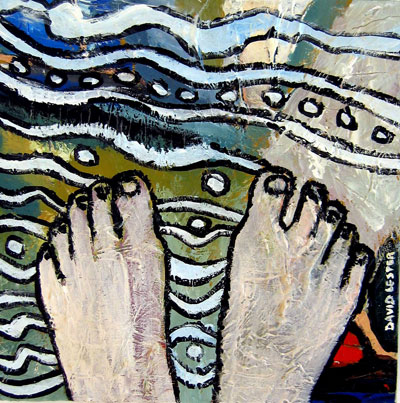 Every Saturday, we’ll be posting a new illustration by David Lester. The Mecca Normal guitarist is visually documenting people, places and events from his band’s 27-year run, with text by vocalist Jean Smith.
Every Saturday, we’ll be posting a new illustration by David Lester. The Mecca Normal guitarist is visually documenting people, places and events from his band’s 27-year run, with text by vocalist Jean Smith.
Nikki McClure has, from time to time, said that Mecca Normal is her favorite band, the band she has seen live more times than any other band.
Nikki’s work has been consistent in many ways, over many years. Looking back, we understand that her tenacity extends beyond paper-cutting time to finding sources of inspiration and honing concepts. The subjects of her artwork exude confidence. Fort-builders, gardeners, lovers. There is nothing tentative about the emotional scenarios she depicts. The viewer responds to her fearlessness with trust. Nikki McClure is an observer you can trust. Her pies are not in the sky. This is the way she lives. You see her family, her friends, their tribe. Were you at the retrospective of another 21st-century artist you might well be looking at images tilted Ordering My Twelfth G&T At The Bar No One Knows I’m At or Crying My Eyes Out Again On The Bathroom Floor or There Goes Another Container Of Ice Cream And Desperate Housewives Isn’t Even Half Over Yet. I don’t think Nikki even has a TV.
I admire that Nikki orchestrates life the way she does, that she articulates it and disseminates it widely, providing the rest of us with a model, a template, to work with.
While the world appears to be spinning farther away from the broad-reaching benefits of responsible living practices, Nikki’s messages remain as emphatic and essential as they were at the beginning of her artistic life and before, in her largely undocumented formative years as a student of science and nature—human and otherwise.
That Mecca Normal’s music and ideas inspire someone as successful as Nikki means that we are successful in our endeavor. It is our intention to inspire activists to continue tenaciously in the face of various types of failure by reinventing their own terms for success and by encouraging non-activists to consider including political content in their art, to include themselves in the long history of making art that intends to change the way things are.
Our mutual cohort, Calvin Johnson has been known to say, “If it ain’t broke, don’t fix it.” While somewhat less poetic sounding, but quite possibly far more profound, Nikki McClure might suggest, “It’s broken. Here’s how we can fix it.”






